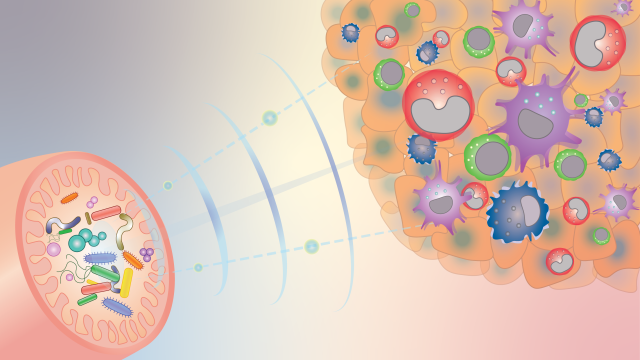
Romina Goldszmid, Ph.D.
- Center for Cancer Research
- National Cancer Institute
- Building 37, Room 4134C
- Bethesda, MD 20892
- 240-760-6897
- rgoldszmid@mail.nih.gov
RESEARCH SUMMARY
Dr. Goldszmid has a long standing interest in understanding the mechanisms governing the development, functional maturation and dynamics of the mononuclear phagocyte cellular network [e.g. dendritic cells, monocytes and macrophages] that plays an instrumental role in host defense. In particular, her research focuses on linking the microbiome, mononuclear phagocyte development, and cancer and infectious diseases with the ultimate goal of identifying new potential therapeutic interventions to improve cancer treatment.
Areas of Expertise

Romina Goldszmid, Ph.D.
Research
Our laboratory aims to understand the underlying mechanisms controlling mononuclear phagocyte (MP) function in pathological situations such as during tumor development or the encounter with an invading pathogen.
The MP cellular network comprises macrophages, monocytes and dendritic cells. These myeloid cells originate during embryonic development or derive from committed precursors in the bone marrow and populate most lymphoid and non-lymphoid tissues. Distributed throughout the body, MPs initiate innate and adaptive immunity against pathogens and tumors, participate in the resolution of inflammation and contribute to tissue integrity. They are also major components of the tumor microenvironment affecting immune evasion, tumor progression, tissue remodeling, angiogenesis and metastasis formation. Individual MP populations control inflammatory settings or stages of inflammation using distinct mechanisms, however, the individual contribution of these distinct cell subsets to the induction and resolution of immunity against invading pathogens, or to anti-tumor responses or immune evasion remains largely unknown.
The focus of our laboratory is to understand what is the relative contribution of the distinct MP populations and what are the critical signals that regulate their development and functional dynamics. We perform comparative studies using cancer and infection models to shed light on the nature of the environmental cues that in pathological situations regulate the differentiation and maturation of individual MP populations. We are particularly interested in the role of the microbiota: combining cellular and molecular approaches together with in vivo studies using germ-free animals we study the effect of commensals on myeloid cell function and their impact on the response to cancer therapy or to the invading pathogen.
Targeting the MP cellular network may be a powerful approach to manipulate the outcome of immune responses; therefore a better understanding of their regulation and functional organization may lead to rational novel therapeutic approaches.
Publications
- Bibliography Link
- View Dr. Goldszmid's PubMed Summary
Multimodel preclinical platform predicts clinical response of melanoma to immunotherapy
IFNAR1 Degradation: A New Mechanism for Tumor Immune Evasion?
Two Bugs a NOD Away from Improving Cancer Therapy Efficacy
Microbiota modulation of myeloid cells in cancer therapy
Host immune response to infection and cancer: unexpected commonalities
Biography

Romina Goldszmid, Ph.D.
Dr. Romina Goldszmid received her Ph.D. working on dendritic cell-based vaccines for melanoma immunotherapy from the University of Buenos Aires, Argentina, part of which was performed as a visiting scholar in the laboratory of Dr. Ralph Steinman at the Rockefeller University. She then did her postdoctoral training in infectious disease immunology with Dr. Alan Sher in the Laboratory of Parasitic Diseases (LPD) at the National Institute of Allergy and Infectious Diseases (NIAID), NIH. Dr. Goldszmid then returned to tumor immunology, joining Dr. Giorgio Trinchieri's laboratory at CCR, NCI, as a Staff Scientist. She is now an NIH Earl Stadtman Investigator in the Laboratory of Integrative Cancer Immunology and an Adjunct Investigator in LPD, NIAID.
Job Vacancies
We have no open positions in our group at this time, please check back later.
To see all available positions at CCR, take a look at our Careers page. You can also subscribe to receive CCR's latest job and training opportunities in your inbox.


